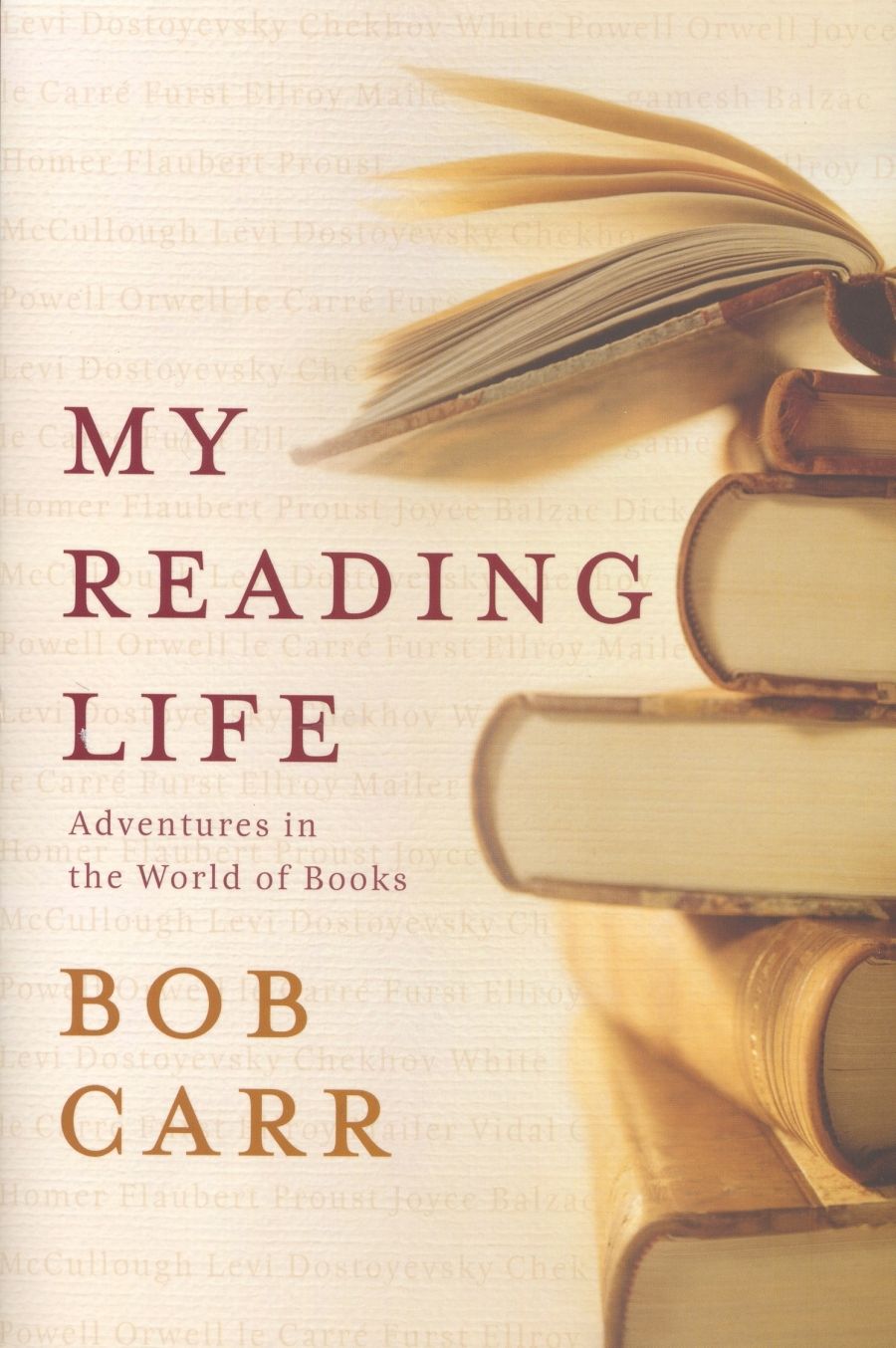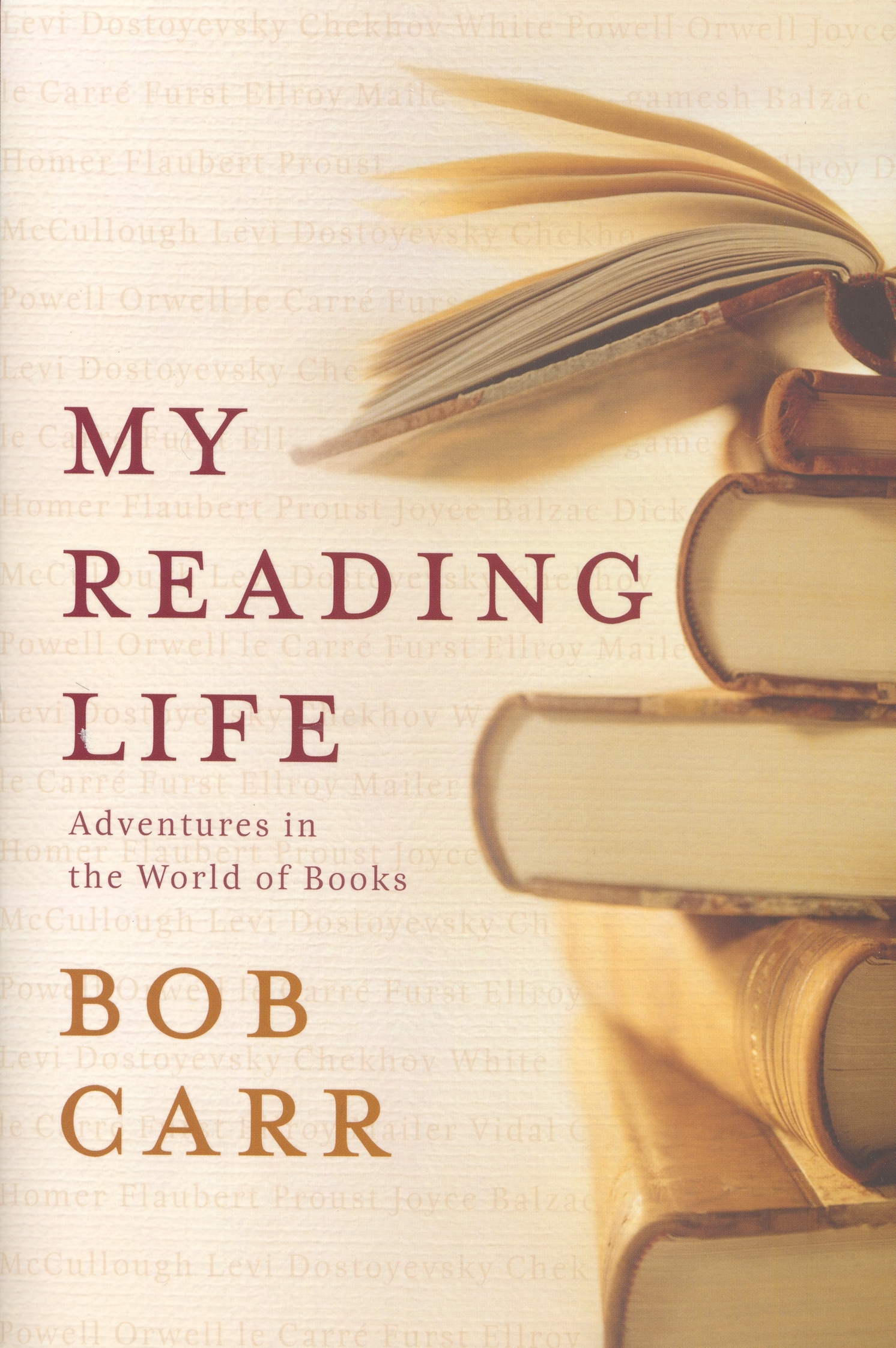
- Free Article: No
- Contents Category: Memoir
- Review Article: Yes
- Article Title: Western love affair
- Online Only: No
- Custom Highlight Text:
Books may furnish a room but they also furnish the mind. As somebody once said, ‘A man is known by the company his mind keeps’. One of my first moves on visiting a home is to check out the bookshelves, to discover something about the owner’s mind. Bob Carr, New South Wales’s longest-serving premier, has conveniently outlined his reading life in this opinionated, sometimes infuriating but always compelling account, which allows us to read his mind without physically visiting his library.
- Book 1 Title: My Reading Life
- Book 1 Biblio: Viking, $35 pb, 422 pp
- Book 1 Cover Small (400 x 600):

- Book 1 Cover (800 x 1200):

Like all those who have briefly supped at the Marxist table, with however long a spoon, the Soviet Union is Carr’s stronger preoccupation (‘Marxism [is] a sort of social pathology peculiar to the last century’). Around ‘boringly didactic’ Hitler hangs ‘the stink … of Auschwitz-Birkenau’; but Stalin is evil incarnate, ‘an evil so vast that conventional histories strain to accommodate it’. In his attack on Marxism, Carr quotes George Orwell, another favourite (‘Orwell must be in our blood’), to the effect that ‘one has to belong to the intelligentsia to believe things like that; no ordinary man could be such a fool’. Carr, in full flight, suddenly pulls himself up to remind the neo-conservatives, who are much addicted to this quote, and no doubt the reader and himself, that Orwell was, after all, ‘a convinced democratic socialist’.
There is nothing socialist about Bob Carr, democratic or otherwise. He confesses that he once believed in the Labor Party’s socialist objective, but now he is happy to dance on socialism’s grave. He found the revisionist Tony Crosland’s book The Future of Socialism (1956) ‘clunky’ – anyhow, ‘socialism was not going to have a future’. The success of Margaret Thatcher and Ronald Reagan, and the reversal of François Mitterand’s socialist project, ‘finished the thing: democratic socialism was packed off for good’. Carr goes so far as to advise the reader never to look at a book with ‘socialist’ in the title.
Carr’s heresy goes even further. ‘Perhaps,’ he wonders, ‘it’s Laborism [by which he means ‘a party with class-specific characteristics and a madcap “socialist objective draped around its neck”] that is wrong’. He is much enamoured of the thesis, advanced by David Marquand in his The Progressive Dilemma (1999), that the British Labour party was all a terrible mistake, and that Britain would have been much better off if the old Liberal party had prevailed and had incorporated the unions without being dominated by them. Tony Blair instinctively agreed; but he never quite had the courage to restore the old progressive alliance by altering the first-past-the-post electoral system. The former premier concludes that ‘socialism, social democracy and laborism are exhibits in some national archival museum’.
These views can be gleaned from his brisk canter through much of the best writing on Australian politics in the last forty years, with some English and French comparative literature thrown in. Gerard Henderson’s Menzies’ Child: The Liberal Party of Australia (1994) gets an accolade – ‘astute, lively and comprehensive’ – though he is more carping on A.W. Martin’s monumental biography of Menzies (‘not the masterpiece … its subject deserves’). The major works on the Whitlam saga are reviewed, the conclusion being that ‘for all Gough’s grandeur, his was an accident-prone, rattletrap Cabinet’; but on the 1975 crisis, ‘Gough wins hands down’. Paul Kelly’s, The End of Certainty (1994, 2008) is ‘the best history of the 1980s’, but he gave up reading Don Watson’s blockbuster on Paul Keating less than halfway through. By contrast, he much admires John Edward’s succinct and ‘hard-nosed assessment’ of John Curtin. As one might expect from this heretic, he now thinks L.F. Crisp was ‘too gentle’ on Chifley, whose bank nationalisation policy was ‘the most politically clumsy and self-defeating initiative of any Australian government in a whole century of politics’.
The ALP must, at times, have been an uncomfortable spiritual home for Carr. He would have preferred to have been an American Democrat under Franklin D. Roosevelt. ‘In another life I could have been a fierce 1930s New York or Chicago congressman, dedicated to the New Deal and passionate about Franklin and Eleanor.’ For Carr, ‘Roosevelt approaches something akin to sainthood’, though in exploring the Roosevelt literature he is seduced by Thomas Fleming’s iconoclastic study of Roosevelt as war leader, The New Dealers’ War: FDR and the War Within World War II (2001). His library list is full of American history and politics, presidential biographies outnumbering those of Australian prime ministers. Of American history, as of all history, he demands ‘the work of real scholars … but … scholars [who] write elegantly’. Thus, in general, he grants a special place to the rich sonorities of Macaulay – ‘my favourite historian’ – and warms to ‘the antithetical phrasing’ of Edward Gibbon; and for the United States the ‘eloquent, scholarly, inspiring’ writing of Arthur Schlesinger Jr. As for American subjects, with the exceptions of his heroes Roosevelt and Abraham Lincoln, he is drawn to ‘the quirky, the crooked … the defeated’. Hence, he cites books on William Jennings Bryan, Thomas Dewey, Richard Nixon, Warren Harding, Huey Long, Calvin Coolidge, and Robert E. Lee.
The obsession of the New South Wales right with the battlefields of the American Civil War has always struck me as one of the more intriguing passions of contemporary politicians, and Carr is not immune; indeed, he may be one of the major vectors. He provides a good reading list for anyone wanting an introduction to that first of modern wars. He also touches on America’s wider wars, though, apart from Schlesinger’s final book, War and the American Presidency (2004), there is nothing on America’s last and most disastrous intervention. Yet the second Iraq War has already yielded a rich harvest of exemplary writing: Bob Woodward on the high politics, Cobra II (2006) on the invasion, Ricks and Packer on the fiasco that ensued. It would have been fascinating to have had Carr’s commentary on these, all of which must be in his library. Perhaps, even he may have concluded, and there is a hint of this, that after all the United States may not be ‘the last best hope of mankind’.
But he shakes off this moment of disillusion: ‘my love affair with an imaginary country starts all over again.’ And what an affair! He is a passionate admirer of most things American. The bulk of the modern fiction included in My Reading Life is American, and the older masters (typically, there are no women) are there: William Faulkner, Saul Bellow, Norman Mailer, William Styron, John Updike, Cormac McCarthy, Don DeLillo. On Faulkner he is perverse, arguing that Patrick White (the old curmudgeon is included in, of all places, a chapter on the best comic writing) is ‘a very much better writer’, and that The Sound and the Fury (1929) is ‘the only Faulkner that warrants reading’. The first opinion is arguable; the second plain wrong. Although Faulkner is an uneven writer, the tragi-comic As I Lay Dying (1930), Light in August (1932), with its near-perfect counterpoint between the lives of the two central figures who never meet, and that Jacobean tragedy set in the Deep South, Absalom, Absalom! (1936) demand to be read.
For a reader so committed to scholarly history, Carr has a surprising penchant for historical fiction. Again, the exemplar of this genre is an American: Gore Vidal, ‘the most formidable historical novelist around’. Vidal gets more space than all but Shakespeare and the Bible. A surprising puff was for Colleen McCullough, ‘the best woman novelist now writing, on the basis of her Roman fiction’. I myself prefer historians to novelists on the fall of the Roman Republic: for example, Ronald Syme’s magisterial The Roman Revolution (1939) or the recent lively but scholarly tome Rubicon (2003), by Tom Holland. I confess to a snobbish sense of McCullough as a writer of ‘good-bad books’ (Orwell’s categorisation). On Carr’s recommendation, I will tackle The Masters of Rome series.
My Reading Life is noteworthy for a near-total absence of contemporary fiction. There is no Tim Winton, no Peter Carey, no Kate Grenville – Australian fiction gets short shrift anyhow, while women writers are almost entirely absent; no Ian McEwan, no Martin Amis fiction (his polemic on Stalin is included), no Salman Rushdie. This is deliberate. ‘Should I dally [over a Booker prize winner] before I have read all of the Russian masters? Reread Anna Karenina? Tackle more Dickens?’ The answer is a defiant no and leads into the second half of the book, which is an eloquent defence of the high literary canon of the Western world.
It is all there, or nearly all there, from the epic of Gilgamesh, through Homer and the Greek dramatists and the Bible, plus a whole chapter on the delights of Shakespeare, to Dostoesvky, Tolstoy, Dickens, Balzac, Flaubert, Proust, Joyce – with Marquez and Lampedusa thrown in for good measure. Carr makes practical suggestions for handling the more difficult works. We will all cavil at particular omissions. I thought the English nineteenth-century poorly done by. What about Jane Austen, George Eliot, William Thackeray, Thomas Hardy? And what about Anthony Trollope? I would have thought Anthony and Bob were made for each other. Clerical conspiracies in Barchester and the politics of the Pallisers should delight Carr. Yet whatever our caveats, we are all in his debt in this anti-élitist age for this courageous advocacy of the great books of Western literature.


Comments powered by CComment